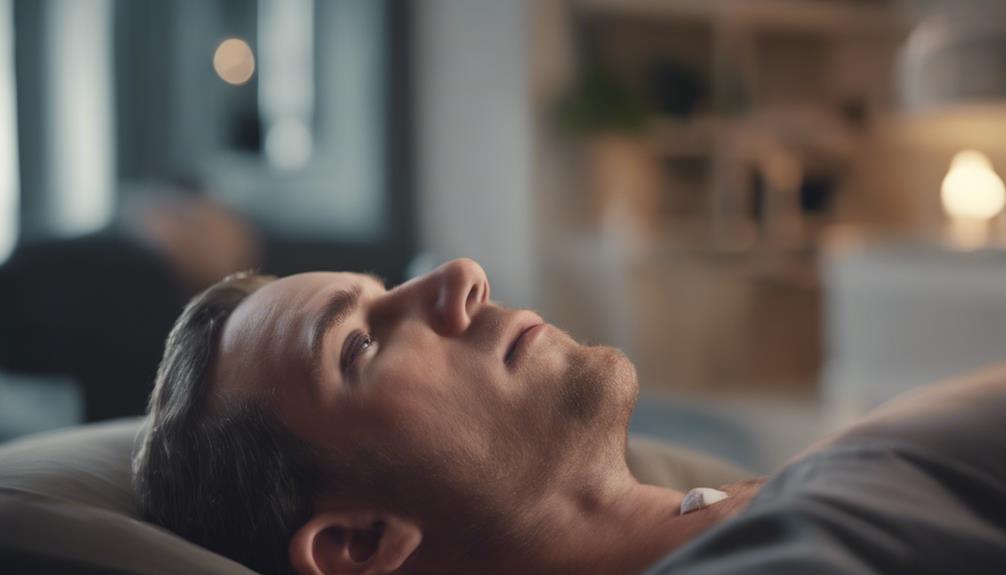
Access the power of hypnotherapy to combat phobias by delving into the subconscious mind for root causes. Regression hypnosis and visualization techniques aid in reprocessing traumatic events, fostering resilience. Using cognitive-behavioral strategies, restructure negative thought patterns for long-term change. Desensitization through incremental exposure gradually diminishes fear responses. Embrace a supportive network for encouragement and positive reinforcement. Tap into your inner strength and conquer fears deeply rooted from childhood experiences.
Key Takeaways
- Utilize regression hypnosis techniques to explore past memories and reprocess traumatic events.
- Incorporate visualization for fear reframing to confront phobic triggers and build resilience.
- Implement cognitive-behavioral techniques to challenge negative beliefs and foster long-term changes.
- Engage in desensitization processes, starting with manageable exposure to phobic triggers.
- Benefit from incremental exposure techniques in a supportive, safe environment for gradual desensitization.
Understanding the Power of Hypnotherapy
Hypnotherapy, a powerful therapeutic technique that explores the subconscious mind, holds immense potential in uncovering and addressing the underlying causes of phobias. When it comes to phobias, which are specific and intense fears that can lead to debilitating anxiety disorders, hypnotherapy can help individuals by delving into the root of their phobic response. By tapping into the subconscious, hypnotherapy allows individuals to access and process deep-seated emotions and experiences that may be contributing to their specific phobia.
One of the key strengths of hypnotherapy in treating phobias is its ability to create a safe space for individuals to confront their fears. Through techniques like visualization, desensitization, and cognitive restructuring, individuals can gradually expose themselves to the object or situation that triggers their phobia in a controlled environment. This process helps in reprogramming the mind's response to the phobic trigger, leading to a reduction in anxiety and fear response over time.
Moreover, hypnotherapy enhances emotional control, empowering individuals to manage their phobic responses more effectively. By addressing the underlying causes of specific phobias, hypnotherapy can lead to rapid positive effects in some cases. Seeking a qualified hypnotherapist for treatment is essential as they can provide tailored interventions to help individuals overcome their phobias and regain control over their lives.
Identifying Root Causes of Phobias
Understanding the root causes of phobias is an essential step towards conquering them.
By analyzing fear triggers and exploring potential childhood traumas, individuals can gain insights into the origins of their fears.
This self-awareness paves the way for targeted interventions that can effectively alleviate the grip of phobias.
Fear Triggers Analysis
Through an in-depth exploration of past experiences and associated memories, fear triggers analysis in hypnotherapy reveals the underlying origins of phobias, paving the way for tailored and effective treatment approaches. By delving into the cognitive behavioural therapy, fear response patterns, exposure therapy, and specific phobias, hypnotherapists can pinpoint the specific events or experiences that triggered the development of phobias. Understanding these root causes is essential in addressing deep-seated fears and creating personalized treatment plans.
Hypnotherapy's focus on exploring subconscious memories and associations related to fear triggers enables individuals to reframe and reprocess the underlying causes of their phobias. This insightful analysis allows for a thorough understanding of phobias, leading to more effective and targeted therapeutic interventions for individuals seeking relief from their fears.
Childhood Trauma Exploration
By examining childhood traumas, individuals can uncover pivotal experiences that may have instigated the development of phobias, shedding light on the origins of their irrational fears.
Hypnotherapy provides a safe space for individuals to explore their subconscious and investigate past traumas that might be linked to their present phobias. Through this investigation, the root causes of phobias can be identified, offering a deeper understanding of why certain fears have manifested.
Childhood trauma, if unaddressed, can continue to fuel irrational fears later in life. Hypnotherapy allows individuals to reframe and process these past experiences, facilitating healing and empowerment.
Understanding the connection between childhood trauma and phobias is an essential step towards overcoming these debilitating fears and reclaiming a sense of control over one's emotions.
Utilizing Regression Hypnosis Techniques

Employing regression hypnosis techniques allows individuals to explore past memories and experiences, uncovering the underlying origins of their phobias for effective resolution at a subconscious level. This method goes deep into the subconscious mind, where early memories are stored, influencing current thought patterns and behaviors. By revisiting these memories in a hypnotic state, individuals can identify the specific events or triggers that led to the development of their phobias. Through this process, individuals can reframe their understanding of these past experiences, leading to profound insights that pave the way for overcoming phobias.
Moreover, regression hypnosis enables individuals to reprocess traumatic events or negative associations linked to their phobias. This reprocessing can result in significant brain changes, altering the neural pathways associated with fear responses. By addressing the root cause of phobias through regression hypnosis, individuals can work towards resolving deep-seated fears and anxieties. The insights gained from this technique can lead to lasting changes in phobic responses, empowering individuals to confront and overcome their fears with a newfound sense of understanding and control. Essentially, utilizing regression hypnosis techniques offers a transformative opportunity for individuals to break free from the constraints of their phobias and embrace a life free from irrational fears.
Implementing Visualization for Fear Reframing
How can visualization techniques in hypnotherapy empower individuals to reframe their fears and take control of their phobias effectively?
Visualization plays an important role in fear reframing by allowing individuals to confront and reframe phobic triggers in a safe and controlled setting. Through creating detailed mental images related to their fears, individuals can gradually desensitize themselves to phobic responses and reduce anxiety levels. By visualizing themselves in scenarios that trigger their phobias, individuals can practice feeling calm, confident, and in control, leading to a shift in their emotional and perceptual responses.
Visualization techniques in hypnotherapy provide a structured approach to exposure therapy, allowing individuals to gradually confront their fears and replace negative associations with positive outcomes. This process enables individuals to experience a sense of empowerment and mastery over their phobias, promoting a healthier relationship with fear. By repeatedly visualizing themselves successfully managing phobic triggers, individuals can build resilience and confidence in dealing with real-life situations that once caused intense anxiety.
Enhancing Treatment With Cognitive-Behavioral Techniques

Enhancing treatment with cognitive-behavioral techniques provides a holistic approach to address and restructure thought patterns and behaviors associated with phobias during hypnotherapy sessions. Phobias often have deep-rooted connections to our mental health, impacting daily life and overall well-being. By integrating cognitive-behavioral techniques into hypnotherapy sessions, individuals can confront and challenge the negative beliefs that fuel their phobias, such as social phobia, in a safe and supported environment.
These techniques serve as powerful tools to help individuals identify and modify irrational thoughts contributing to their phobic reactions. Through cognitive restructuring, individuals can learn to replace these negative thought patterns with more balanced and realistic perspectives. This process not only assists in managing the immediate symptoms of phobias but also fosters long-term changes in how individuals perceive and respond to their fears.
Gradual Exposure for Desensitization
Gradual exposure for desensitization is a powerful technique that allows individuals to confront their fears step by step.
By using incremental exposure techniques, individuals can slowly build their tolerance towards the phobic trigger.
This method aims to decrease the emotional intensity associated with the fear, paving the way for overcoming phobias and anxiety disorders effectively.
Step-By-Step Desensitization Process
To effectively address phobias, the step-by-step desensitization process plays a pivotal role in gradually alleviating the emotional intensity associated with the phobic trigger. This method involves exposing oneself slowly to the source of fear, helping to reduce the overwhelming emotional response over time.
Here is a structured approach to the step-by-step desensitization process:
- Start with a manageable exposure to the phobic trigger.
- Gradually increase the intensity or duration of exposure in subsequent sessions.
- Practice relaxation techniques during exposure to manage anxiety.
- Repeat the process consistently to reframe the perception of the phobic trigger, leading to reduced fear and anxiety responses.
Incremental Exposure Techniques
In the process of overcoming phobias through hypnotherapy, implementing incremental exposure techniques is a fundamental aspect that fosters gradual desensitization to the phobic triggers. Through controlled exposure in a state of hypnosis, individuals can confront their fears in a secure and supportive environment.
Building a Supportive Network for Success

Embracing a supportive network can greatly enhance your journey towards conquering phobias through hypnotherapy. When dealing with phobia struggles, having a strong support network can make a significant difference in your therapeutic journey. Here are some ways in which building a supportive network can lead you to success:
- Share Your Phobia Struggles: Open up to understanding friends or family members about your fears. Expressing your feelings can help alleviate anxiety and provide a sense of relief.
- Talk About Your Fears: Discussing your phobias with your support network can offer comfort, especially when facing triggers. Their presence and reassurance can make exposure therapy more manageable.
- Involve Your Support Network: Include your loved ones in your therapeutic journey. Their encouragement and support can serve as a source of motivation and strength as you work towards overcoming your phobias.
- Seek Positive Reinforcement: During phobia treatment, lean on your support system to receive positive reinforcement. Their affirmations and belief in your progress can boost your confidence and determination to confront your fears.
Frequently Asked Questions
What Is the Most Successful Treatment for Phobias?
Exposure therapy, cognitive restructuring, mind-body techniques, and virtual reality therapy are recognized as effective treatments for phobias. These approaches allow individuals to confront and reframe their fears gradually, challenging negative thought patterns and desensitizing themselves to triggers.
What Strategy Is Most Effective for Overcoming a Phobia?
When addressing phobias, a multi-faceted approach can be highly effective. This approach incorporates exposure therapy, relaxation techniques, cognitive restructuring, and virtual reality therapy. Exposure therapy gradually exposes individuals to their fears in a controlled environment. This helps desensitize them to the phobia triggers. Relaxation techniques and cognitive restructuring assist in managing anxiety and reframing negative thoughts associated with the phobia. Virtual reality therapy offers a safe environment to confront phobias, allowing individuals to face their fears in a controlled and immersive setting. By combining these strategies, individuals can make significant progress in overcoming their phobias.
What Is a Very Successful Technique for Overcoming Phobias?
Exposure therapy, a cornerstone of phobia treatment, involves gradual and controlled confrontation with feared stimuli to reduce anxiety responses.
Cognitive behavioral therapy (CBT) equips individuals with coping mechanisms and tools to reframe negative thought patterns.
Mind-body techniques like relaxation and mindfulness can complement traditional therapies for enhanced outcomes.
Virtual reality therapy provides immersive, realistic scenarios for exposure in a safe environment.
Integrating these approaches can offer a holistic and successful strategy for overcoming phobias.
Does Hypnotherapy Really Work for Phobias?
Hypnotherapy has shown effectiveness in treating phobias by tapping into the subconscious mind and facilitating rapid positive changes. Despite common misconceptions, hypnotherapy offers benefits in fear reduction by enabling individuals to confront and reframe their fear responses.
Through techniques like visualization and desensitization, hypnotherapy allows for realistic experiences of imaginal situations, aiding in desensitizing phobic triggers. This approach can be particularly effective when combined with other therapies like cognitive-behavioral therapy.
Conclusion
To sum up, hypnotherapy offers a powerful tool for overcoming phobias by delving into the subconscious mind and addressing root causes.
By utilizing techniques such as regression hypnosis, visualization, cognitive-behavioral strategies, gradual exposure, and building a supportive network, individuals can conquer their fears and live a more fulfilling life.
Like a beacon of light guiding through a dark tunnel, hypnotherapy can lead individuals towards a path of liberation from their phobias.





